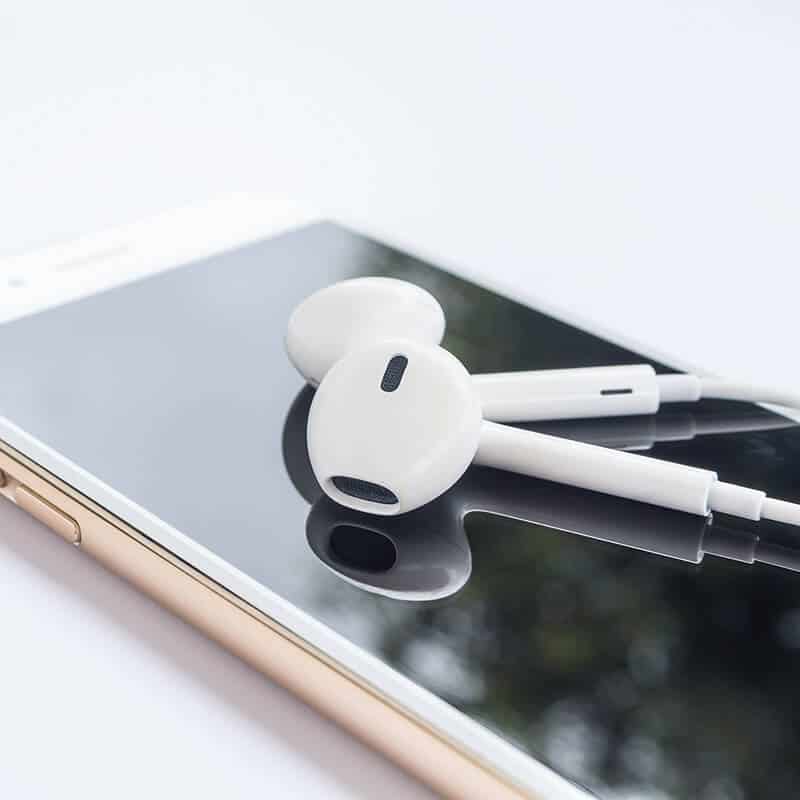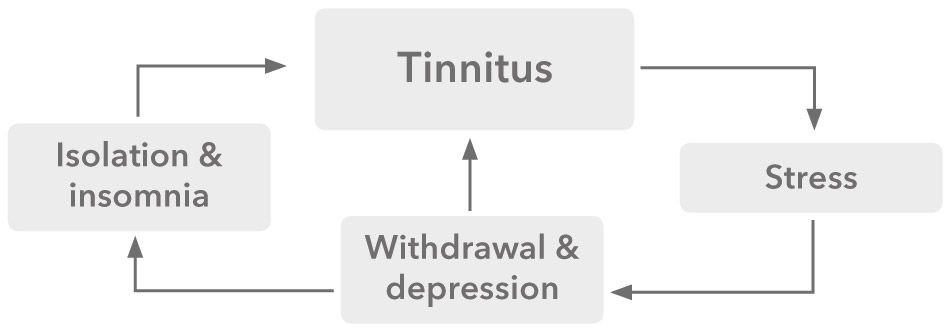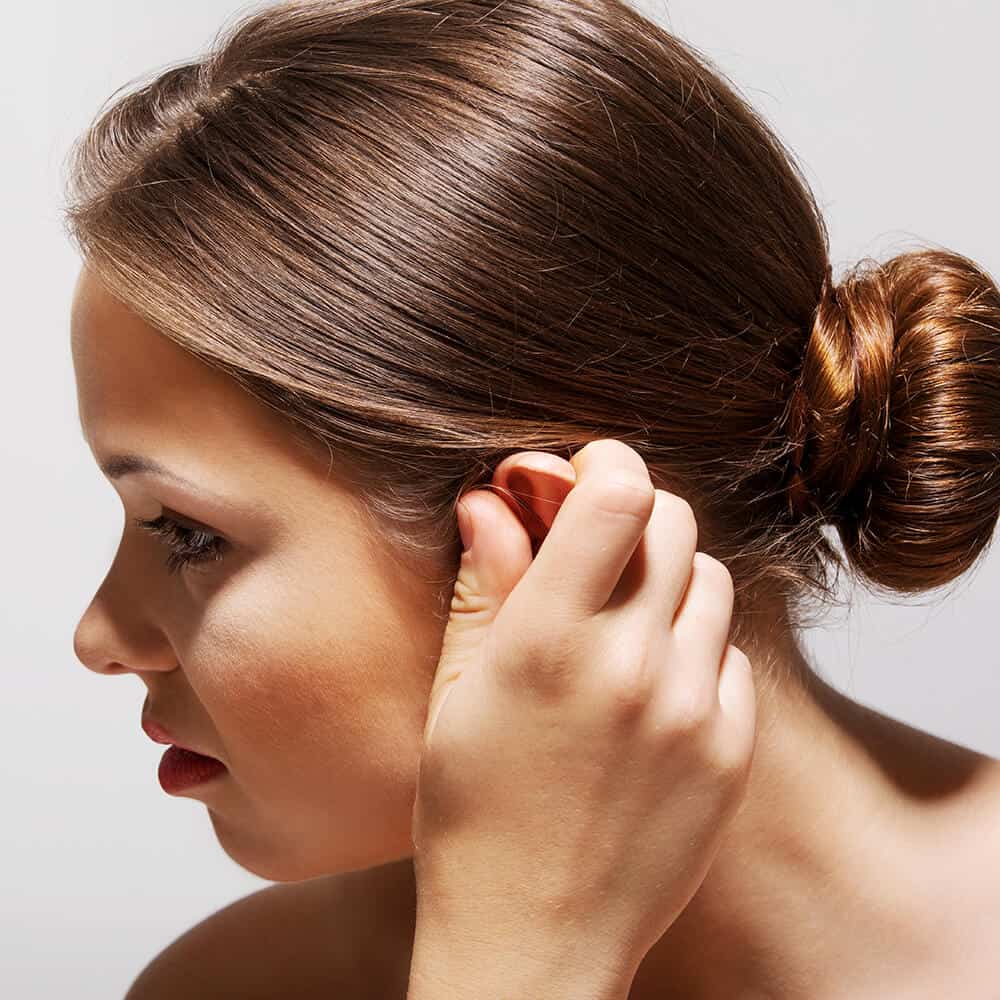Tinnitus

Causes of tinnitus vary.
Though the exact cause of tinnitus — as in the specific mechanism that creates these phantom sounds in some people — remains unknown, contributing factors and triggers have been identified. Excessive exposure to loud noise is often a factor because of the damage done to your auditory system. Tinnitus may also result from jaw-joint dysfunction (e.g., teeth grinding, temporomandibular joint disorder) or chronic neck muscle strain.
While tinnitus is as varied as its causes, it can be grouped into two categories: tonal and non-tonal. Tonal tinnitus is more common and describes the perception of a near-continuous sound or overlapping sounds with a well-defined frequency (e.g., whistling, ringing, buzzing). Non-tonal forms of tinnitus include humming, clicking, crackling, and rumbling.
Tinnitus is identifiable.
Not knowing the exact cause of your tinnitus doesn’t make your symptoms any less real.
Brain scans indicate increased metabolic activity in the region of the left auditory cortex in tinnitus patients, suggesting that tinnitus is not exclusively related to the ear.
Conscious and unconscious perception of sound.
Normally about 30 percent of external sounds are consciously perceived, while the rest unconsciously fade out. When this filtering function works properly, it enables you to ignore some sounds. But when it is damaged, undesired sounds can be excessively amplified.
When hearing is intensely stimulated for a long time, it can result in a residual sensory perception even though the stimulating factor is long gone. So, it’s important to have your attention distracted away from the tinnitus in order to prevent a chronic manifestation.
Tinnitus sufferers most often cite stress as the cause of their condition. While it’s true noises are perceived more acutely when you are tense, there is no scientific basis for saying stress causes tinnitus. But the reverse is definitely true — hearing a constant noise in your ears can certainly cause stress and anxiety, and even lead to depression in some cases.


Each type of tinnitus has its own cause.
The following are the four types of tinnitus and their known contributing factors:
Another known cause of tinnitus is taking ototoxic (“ear poisoning”) medications. Once dosages are reduced or stopped entirely, the noises also usually disappear. But certain medicines can cause irreparable damage, resulting in hearing loss and/or permanent tinnitus.
More than 50 percent of tinnitus sufferers have hearing loss.
Research shows a frequent correlation between tinnitus and hearing loss. Because tinnitus is perceived differently by each sufferer, an exact diagnosis is essential. A doctor may conduct ENT, dental, orthodontic, and orthopedic examinations in order to establish whether a case can be medically treated or not. The pitch and volume of tinnitus can be determined by special diagnostic test, and a hearing test can reveal whether hearing loss is also involved. Treatment with hearing aids is often the first step to relief from tinnitus. Hearing aids compensate for hearing loss, which enables concentration on external sounds instead of internal noises.
Additional physical and psychological conditions have been linked to tinnitus. Continue reading through this section for more information.

Tinnitus-Related Medical Conditions
Is your tinnitus a sign of an underlying illness?
For many patients, tinnitus is more than an annoying affliction — it may be a warning sign of an as-yet undiagnosed threat to your overall health. In some cases it may be the cause; in others the symptom. The following are just some of the serious conditions associated with tinnitus.
Meniere’s disease.
The combination of symptoms that are classified as Meniere’s disease include tinnitus. Those with this condition also experience bouts of dizziness and vertigo that can be debilitating, and hearing loss. To date the cause of Meniere’s disease has yet to be identified and there is no cure. Symptoms can be controlled in some by reducing salt intake, taking diuretics, and using anti-vertigo medications to manage attacks. Hearing aids can be used to treat any hearing loss.
Anxiety and depression.
For some tinnitus sufferers the constant humming becomes overwhelming, disturbing sleep and disrupting daily life. The constant noise can set off negative emotional and behavioral reactions that make you focus on it to the exclusion of everything else. For example, if tinnitus makes you feel stressed, you might lose interest in socializing. Acute anxiety, depression, chronic stress and similar disorders often result. These conditions may be eased by antidepressants and working with a therapist to find coping techniques. Hearing aids with tinnitus therapy features can also help by allowing you to concentrate on outside sounds. They can be used to provide relief even if you don’t have hearing loss.
Temporomandibular Joint Disorder (TMD).
TMD occurs when the jaw, jaw joint and muscles required for chewing, talking and moving the jaw do not function properly. Besides tinnitus symptoms often include toothaches and facial pain, headaches, dizziness and hearing problems. The cause may be as clear as an accident involving whiplash, grinding your teeth in your sleep or arthritis, or the reason may be more difficult to pinpoint. Treatments are available, including the following:
Wondering if you have tinnitus? Use our checklist to help determine if you have this condition.

Do I Have Tinnitus?
Tinnitus facts.
A number of articles have come out in recent years about tinnitus. You might be wondering if you have this condition, and if so what you can do about it. First, here are a few facts* you need to know:
* hear-it.org referenced on 12/03/2014.
Checklist.
Here is a list of questions about the phantom noise that afflicts approximately 50 million people in the US alone. Use them to help you decide whether it’s time to see a hearing care professional for a formal diagnosis. We suggest you jot down your responses for future reference.
If you answered “yes” to one or more of these questions, you might have tinnitus. Tinnitus takes different forms and its effects are unique to each sufferer. And although for most types there is no complete cure, many effective treatment options are available to alleviate your discomfort.
Next steps.
If you haven’t already, we recommend you spend some time reading through the comprehensive tinnitus information presented on our site, including suggestions on how you can manage the symptoms of tinnitus.
Managing Tinnitus
Taking control.
As you search for a solution, it’s important to remember that tinnitus is not an illness, but a symptom — similar to pain. The goal is to find relief from this symptom. Even if no specific cause is determined, tinnitus can be treated. There are many ways for you to cope with your condition, including by changing habits and attitudes so that tinnitus no longer controls your everyday life. The term tinnitus management covers various ways of adopting a new approach to tinnitus.
Cognitive-behavioral tinnitus training, for instance, is very promising. Your personal mindset and feelings play a decisive role in this method. Training sessions with varied content promote self-help. Training focuses on targeted information, an analysis of behavior, practical exercises, and positive experiences. Cognitive-behavioral tinnitus training focuses on the following aspects:

Learning more
Treatment options.
Since tinnitus is normally a symptom of an underlying condition, be it sensorineural hearing loss or circulatory disorder, it can only improve if the fundamental problem is treated successfully.
Some tinnitus treatment options include the following:
However, for millions of sufferers the condition causing tinnitus cannot be identified or is incurable itself. In these cases, treating the symptom directly or learning to live with the irritating sound may be the only tinnitus remedies available. The following tips can help you find relief from tinnitus:
Many patients benefit from wearing hearing aids.
Hearing aids can make it easier to listen to external sounds instead of permanently concentrating on annoying internal noises. Learn more about what hearing aids can do to alleviate your tinnitus symptoms.

Solutions for Tinnitus
Your peace of mind comes first.
Besides amplifying the sounds around us, most of our hearing aids also include a tinnitus therapy feature. How does this work?
In very quiet hearing environments, regular hearing aids don’t have enough external sounds to amplify to distract you from your tinnitus. This is when the tinnitus therapy feature comes in. By emitting a customized therapy signal — a soothing sound like waves rolling into a beach — it distracts you from focusing on the ringing in your ears. Our hearing aids are equipped with different therapy signal types, including four nature-inspired ocean wave signals and five pre-programmed static sounds (e.g., white noise).
Modern hearing aids help alleviate tinnitus.
Our static noise tinnitus therapy signals and ocean wave tinnitus therapy signals are now complemented by Notch Therapy. Signia hearing aids are the only ones with built-in Notch Therapy, which can reduce the effects of tinnitus so that it’s no longer perceived as disturbing.* Tinnitus therapy from Signia means a less stressful, more peaceful state of mind.
Hear what's important without the stress.
Signia hearing aids are tiny technological marvels. They not only amplify sounds and improve hearing, they also provide a range of solutions to alleviate the effects of tinnitus.
While tinnitus is as varied as its causes, it can be grouped into two categories: tonal and non-tonal. Tonal tinnitus is more common and describes the perception of a near-continuous sound or overlapping sounds with a well-defined frequency (e. g., whistling, ringing, buzzing). Non-tonal forms of tinnitus include humming, clicking, crackling, and rumbling.
Three strategies. Optimum results.
We offer three different strategies against tinnitus.
Static noise tinnitus therapy and ocean wave tinnitus therapy cover up disturbing tinnitus sounds with individually tuned therapy signals that divert attention away from the tinnitus, reducing its impact. As a result, you can relax and concentrate on what you want to hear.
Signia hearing aids are the only ones with built-in Notch Therapy, which is clinically proven to reduce the annoyance of tinnitus.*
Static noise tinnitus therapy signals.
Soft and gentle sounds that take away the annoyance of tinnitus.
Signia hearing aids feature a tinnitus therapy feature that generates additional sound in the form of a soft therapy signal. This effectively distracts you from the tinnitus, helping you to relax and enjoy life. In addition to a range of presets, the therapy signals can be customized to your specific needs.
Static noise therapy signals use a form of sound that mixes in with the tinnitus sounds and distracts from it. Signia hearing aids offer five different types of signal so that your hearing care professional can help you choose the most comfortable solution.
Ocean wave tinnitus therapy signals.
What could be more relaxing than the sound of a seashore?
Inspired by the tranquil sound of the sea lapping against the shore, ocean wave therapy signals replicate the relaxing feeling of being on a beach. Ocean wave therapy signals mimic the sound of the sea to provide a positive, soothing, and stress-relieving listening experience.
Your hearing care professional can help you choose from four different signals to find the one that is most relaxing and comfortable.
World’s first: Tinnitus Notch Therapy.
Reducing the annoyance of tinnitus for a truly peaceful experience.
Signia hearing aids are the only ones with built-in tinnitus Notch Therapy. This method is especially effective for people who experience tonal tinnitus, the most common type.
Unlike the static noise and ocean wave approaches, which introduce an additional therapy sound, Notch Therapy treats your tinnitus inaudibly and unobtrusively. All you have to do is wear your hearing aids as you normally would, and it could reduce the annoyance of your tinnitus in just weeks or months.
Potent relief from tinnitus.
Notch Therapy offers the potential of reducing tinnitus sounds until they’re no longer perceived as disturbing*. By permanently relegating the tinnitus sounds into the background over a long period, over-stimulation is reduced and your brain ‘learns’ to ignore the irritating sounds, bringing relief.
* Powers, L., dos Santos, G.M., & Jons, C. (2016, September). Notch Therapy: A new approach to tinnitus treatment. AudiologyOnline, Article 18365.
The ideal combination of tinnitus therapies and outstanding hearing.
Signia offers a large selection of hearing aids with the most modern hearing technology, which includes various tinnitus therapies. These therapies provide an optimum individual solution for outstanding sound quality and hearing experience.
Available in a range of small, discreet styles for every form of hearing loss, there’s a model to meet every need. And for complete convenience and discretion, they can even be controlled remotely via a mobile phone app.
Ask about our tinnitus therapy options.
Find the optimum tinnitus strategy for you by getting in touch with your hearing care professional — they will be happy to advise you. They’ll help you select the ideal hearing aid and find the perfect tinnitus therapy, as well as give you tips and tricks to make life with tinnitus more relaxing.
Learn more about our solutions for hearing loss and tinnitus.
Have Questions?
Get in touch with us today to get answers to questions or schedule an appointment.
